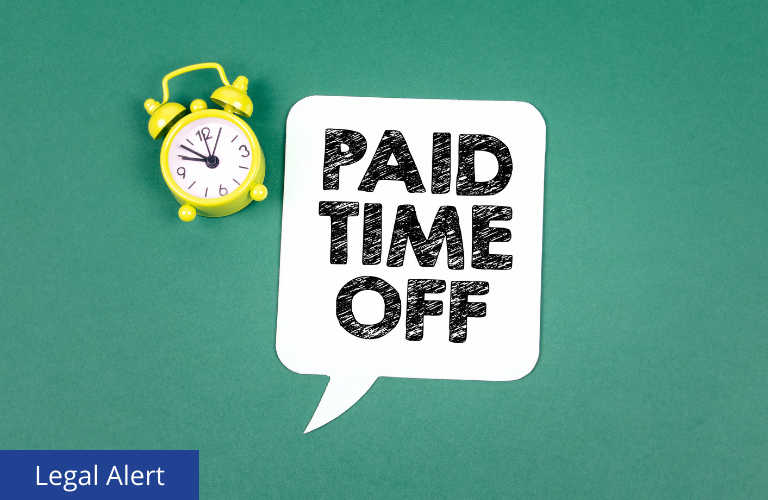
Chicago and Illinois employers should revisit their paid leave policies before the New Year.
Illinois’ Paid Leave for All Workers Act (“PLFAW Act”), 820 ILCS 192/1 et seq., effective January 1, 2024, applies to nearly all Illinois employers (outside of those covered by the more generous Chicago and Cook County laws), with limited exceptions. Under the PLFAW Act, employees must accrue at least 1 hour of paid sick leave for every 40 hours worked up to a minimum of 40 hours annually, unless the employer allows more leave. Alternatively, employers can frontload the full amount of leave on the first day of employment or the beginning of the designated 12-month period. The law does not distinguish between full or part-time employees. An employee may take PLFAW leave in increments of 2-hours (unless an employer allows an employee to take leave in smaller increments), or unless an employer’s existing policy already meets the hours and use requirements of the Act. Accrual begins upon the employee’s start of employment, or January 1, 2024, whichever is later. The rate an employee is paid tracks the “regular rate” under the Fair Labor Standards Act, and tipped employees must be paid at least the full minimum wage in the jurisdiction in which they are employed when paid leave is taken.
Notably, paid leave can be used for any reason, and does not have to be for sick leave for the employee or their family member. However, the State has further explained in its Paid Leave for All Workers Act FAQ that “Nothing in the Act prohibits an employer from adopting a policy that establishes some parameters for taking leave, and limited reasons the employer may deny leave for operational necessity.” The State has promised further clarity in future regulations, which should be in place by March 31, 2024.
While the PLFAW Act requires rollover of unused leave from one accrual period to the next, there is no obligation for employers to offer more than 40 hours of paid leave in a year. Accrued but unused PLFAW leave need not be paid out on termination, unless employers have designated the leave as vacation or otherwise payable on termination.
Effective December 31, 2023, Chicago has also amended its Paid Leave and Paid Sick and Safe Leave Ordinance to require eligible employees to accrue up to 40 hours of sick leave as well as 40 hours of paid leave that can be used for any reason. Chicago law also has different accrual rates than Illinois law—Chicago employers must allow Chicagoans to accrue one hour of paid sick leave in addition to one hour of paid leave for every 35 hours worked. Sick leave may used for the employee or their family member’s sickness, doctor’s appointments, or a number of other uses provided by the law. Further, the law applies to part-time workers, but expressly states that “part-time” means the employee performs at least 2 hours of work for the employer in any 2-week period of time. Employers may state that employees cannot use paid sick leave until they have been employed 30 days, and cannot use paid leave until they have been employed 90 days.
The Chicago law also allows front-loading of paid leave, and provides that employees can carry over up to 80 hours of paid sick leave and up to 16 hours of paid leave from one 12-month period to the next (unless the paid leave is front-loaded, in which case no rollover is required). In contrast to Illinois law, employers may require paid sick leave to be taken in 2-hour increments and paid leave to be taken in 4-hour increments. For paid leave, employers are allowed to require that the employee provide reasonable notice (not exceeding 7 days) of the need for leave. Employers may also require pre-approval to ensure continuity of business operations. As for paid sick leave, an employer may require up to 7 days’ notice if the need for leave is reasonably foreseeable (such as a scheduled doctor’s appointment), or if the reason for notice is not reasonably foreseeable, the employee can give notice “as soon as is practicable” on the day the leave is needed.
Many employers will not be required to pay out accrued but unused paid leave or paid sick leave on termination, unless they have 51 or more employees, in which case employers may be required to pay out some or all of employees’ accrued but unused paid leave.
Employers’ policies may already provide sufficient leave under the PLFAW Act and/or Chicago law; however, policies should be reviewed to determine compliance with other requirements of the laws and any forthcoming regulations. If you have any questions regarding the issues raised in this client alert, please contact your Labor and Employment counsel at Smith, Gambrell & Russell, LLP.

